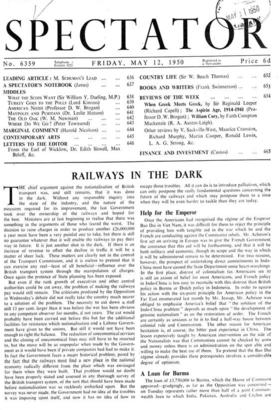RAILWAYS IN THE DARK
But even if the rank growth of executives and other central authorities could be cut away, the problem of making the railways pay would still remain. The criticisms produced by the Opposition in Wednesday's debate did not really take the country much nearer to a solution of the problem. The necessity to cut down a. staff still 13 per cent. larger than it was before the war has been obvious to any competent observer for months, if not years. The cut would probably have been carried out before this but for the additional facilities for resistance which nationalisation and a Labour Govern. ment have given to the unions. But still it would not have been enough to right the balance. The reduction of uneconomical services and the closing of uneconomical lines may still have to be resorted to. but the move will be as unpopular when made by the Govern- ment as it would have been if private companies had had to make it. In fact the Government faces a major historical problem, posed by the fact that the railways must find a new place in the national economy radically different from the place which was envisaged for them when they were built. That problem would no doubt have been properly stated and assessed in any thorough survey of the British transport system, of the sort that should have been made before nationalisation was so recklessly embarked upon. But the survey was never made, the Government had no idea of the troubles it was imposing upon itself, and now it has no idea of how to
escape those troubles. All it can do is to introduce palliatives, which can only postpone the really fundamental questions concerning the future of the railways and which may postpone them to a time when they will be even harder to tackle than they are today.






































